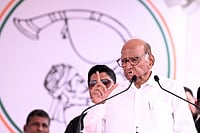At the conclusion of the seventh round of India-UK free trade agreement (FTA) negotiations and ahead of the eighth round scheduled in New Delhi next month, a senior industry expert in the UK believes there are encouraging signs of appetite on both sides to agree a deal and fully utilise its benefits.
Syma Cullasy-Aldridge is the Chief Campaigns Director at the Confederation of British Industry (CBI) and has just returned after leading the group’s first-ever business delegation to New Delhi and Mumbai aimed at unlocking opportunities of a potential FTA .
The Indian-origin campaigns chief for the industry body , which speaks on behalf of 190,000 UK businesses of all sizes and sectors, described the visit as “really, really brilliant” in highlighting the immense scope for partnership and collaboration across key sectors.
“What really struck me was the opportunity and appetite on both sides for collaboration and partnership around key sectors like green finance, innovation and new technology – areas where there are skills and education on both sides,” said Cullasy-Aldridge.
“The seventh round was on here while we were in India. It's encouraging to see negotiations progressing and also encouraging to see appetite on both sides to make sure that we do agree [a trade deal] and then utilise it well,” she said.
The last round of talks concluded on February 10.
Cullasy-Aldridge highlighted a recent Cabinet mini-shuffle by British Prime Minister Rishi Sunak which brought the government's trade and business departments together under Secretary of State Kemi Badenoch and termed it a “really good thing”.
“It means that you're looking at trade from a business perspective, having business working hand in hand with trade. That is a good thing because then you have better outcomes,” she said.
“We have an opportunity [post-Brexit] to forge our own trading relationships. There's a big global Britain ambition and India is the fastest growing economy in the world. There's opportunity for the UK to partner with India on that growth story,” she added.
According to the CBI, an India-UK FTA could boost trade with India by 28 billion pounds a year by 2035 and increase wages across the UK by 3 billion pounds.
Its trade delegation earlier this month was very much focussed on the utilisation aspect of such a potential pact by businesses.
“The UK is obviously looking to take advantage in a post Brexit world of new trading opportunities and one thing that COVID taught us was that you need to diversify your supply chains, and everybody around the world knows that now,” said the executive, who has previously worked within the UK government’s business department.
“Supply chains are incredibly complicated things and so, of course, it will take time. Meanwhile, we're very much up for working with the government to help with trade agreement utilisation because these shifts will happen more effectively through engagement with business,” she said.
She pointed to opportunities over India’s G20 presidency and the corresponding B20 – or business segment – being led by the Confederation of Indian Industry (CII).
Asked about hurdles that CBI foresees in the way of an FTA which has already missed a Diwali 2022 deadline for completion due to political upheavals in the UK, Cullasy-Aldridge said there would always be some hurdles in any trade negotiation, asserting that they are “incredibly complicated legal documents”.
“So, it's important to take the time to get them right. But I'm actually more interested in utilisation – how companies will use the trade deal once it is in place. And that's why things like trade delegations are so important, because it's about businesses on both sides understanding the opportunities so they know how they can make the most of it,” she said.
Official UK government data pegs India-UK bilateral trade at around 29.6 billion pounds a year, a figure expected to receive a major boost with an FTA both sides hope can be concluded this year.


























